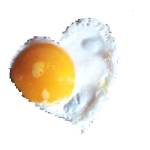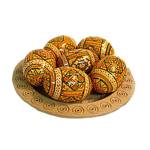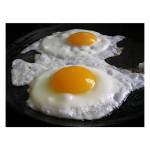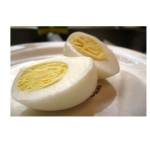EGG AS FOOD
The egg appreciated from yesteryear.
For thousands of years many cultures have given the egg a privileged space between their beliefs and traditions most deeply rooted.
Celts, Greek, Chinese, Japanese, Egyptians and Hindus, all ancient cultures, egg saw the beginning of the Universe. For these cultures the egg symbolizes the origin of Ying (heaven) and Yang (land) in the case of Chinese culture, for other egg symbolized fertility and periodic renewal of nature.
For Christians around the world, at Easter time, represents the resurrection and the life, It is for this reason that during Holy Week, It is the symbol of celebration.
Today has worked extensively in the area of research on all the nutritional contributions offered by the egg, because due to myths and mistaken beliefs, has been misjudged by decreasing their consumption in countries like ours remains high rates of malnourished children.
The egg is a natural wonder so knowing about all nutritional contributions provides is part of a good diet culture.
Studies reveal stop eating eggs can be detrimental to our health, because they bring us a high quality package for protein, vitamins, minerals, essential fatty acids and antioxidant package which are of great benefit to improve our quality of life.
The consumption of eggs,
Does not raise cholesterol levels
People hear the word egg, automatically think bad cholesterol and that is: EGG = = BAD CHOLESTEROL
In fact egg yolks contain only a third of cholesterol necessary for the proper functioning of our body.
Eggs also provide essential nutrients, such as proteins of high biological value, riboflavin, folatos, vitamin B12, D, A, and E among others.
Recent research, show that saturated fats are responsible for raising cholesterol levels, no cholesterol content in foods, known as dietary cholesterol.
These studies demonstrated that dietary cholesterol has no influence or little influence, cholesterol levels in blood, for most people. In fact the relationship between egg consumption and cholesterol levels do not pose a risk of heart disease or cerebrovascular for healthy people.
On the contrary it has been found that Egg is an excellent source of choline which can help achieve lower cholesterol, well as improve memory and learning ability.
People with problems in cholesterol metabolism, maintain high levels, so you have to limit your consumption of egg yolks, but this does not limit them to prepare recipes containing clear, source of high quality protein, contain all essential amino acids for the proper functioning of our body, combined with plant.
Most people, who do not have cholesterol, daily intake of one egg provides:
- Proteins Highest Quality
- 13 vitamins (Complex B, D, A, And, K)
- Minerals, as iron, zinc, selenium, manganese, match, football, potassium, sodium,
Eggs are: Very Cheap, convenient, versatile and very, very, nutritious.
"The Secret is in the Egg"
Our daily egg: There are particularly sensitive consumer groups such as the elderly, pregnant women and infants, to be ensured in the diet a contribution of high quality protein, well be in a period of growth or old age. Therefore, egg consumption to improve the quality of their food.
Since life begins: One area of research interest is the hill, an essential nutrient. One egg contains 215 milligrams of choline which is concentrated in the yolk. The Institute of Medicine US, recommends that adequate intake of choline is 550 milligrams for men and 425 for women.
It has been shown that choline intake is essential for brain development of the fetus and newborn.
Ideal for soft diets: The egg is indicated as soft diet for the treatment and recovery of sick or convalescent, components therein are easily absorbed. Besides the need for protein increases when it comes to people in post-operative phase or persons exercising intense physical activity (Athletes).
Valuable contribution of vitamin D: The contribution of vitamin D is precious egg, since in practice food provides a very low amount of it. This vitamin helps the binding of calcium in the bones, in children prevents rickets and osteoporosis in the elderly. Although vitamin D can be synthesized in the skin to sun exposure, in cases of sick or people leaving little house, egg consumption can be critical.
To lose or maintain your weight: Studies show that breakfast eggs at least two daily, in the way that prefers, have a beneficial effect in helping maintain a healthy weight, this is due to the effect of satiety that produce and prevents or reduces the calories in the day, promoting weight loss. Eggs are also a good proportion of nutrients relative to calories (between 75 a 80) containing.
Antimicrobial: Eggs have physical and biological systems against invading microorganisms; both, the white and yolk contain certain proteins that have been shown to possess antimicrobial activity
Reduce the risk of cataracts: Has also been demonstrated that the egg contains carotenoids (pigments that exist in plant and animal foods) protects against macular degeneration of the eye, serious age-related disease. Even if we eat eggs at an early age, the risk of cataracts may subsequently reduced by up to 60%.
Strengthens the immune system: The egg is ideal for providing immunological factors that reinforce in the child's ability to defend against disease.
It is very economical: The egg, presents a much lower cost than other foods with a similar nutritional value.
Claudio Fano








Leave A Comment